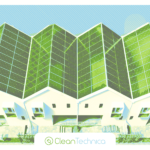What is General Energy Efficiency?
Energy efficiency is the use of less energy to achieve the same level of output as would be achieved by using more energy. In other words, it is the use of energy in such a way that the least amount of energy is consumed while still achieving the desired result. General energy efficiency is a broad term that encompasses various aspects of energy conservation, including the design, construction, and operation of buildings, homes, and industries.
Benefits of General Energy Efficiency
Economic Benefits
General energy efficiency can lead to significant economic benefits, including:
- Reduced energy costs: By consuming less energy, businesses and individuals can save money on their energy bills.
- Increased productivity: With more energy available for use, businesses can increase their productivity and competitiveness.
- New job creation: The energy efficiency industry is creating new job opportunities in areas such as installation, maintenance, and research and development.
Environmental Benefits
General energy efficiency also has numerous environmental benefits, including:
- Reduced greenhouse gas emissions: By consuming less energy, we can reduce the amount of greenhouse gases released into the atmosphere, contributing to climate change.
- Preservation of natural resources: By conserving energy, we can reduce the demand for fossil fuels and other non-renewable resources.
- Improved air quality: By reducing the amount of energy consumed, we can also reduce air pollution and improve air quality.
Ways to Improve General Energy Efficiency
Building Design and Construction
Building design and construction play a crucial role in improving general energy efficiency. Some ways to do this include:
- Using energy-efficient materials: Building materials with low embodied energy and high recycled content can help reduce the energy consumption of a building.
- Designing buildings for natural lighting: Buildings that incorporate natural lighting through the use of skylights, clerestory windows, and other features can reduce the need for artificial lighting.
- Improving building insulation: Insulating buildings can reduce heat loss in the winter and heat gain in the summer, reducing the need for heating and cooling.
Appliances and Lighting
Appliances and lighting are other areas where general energy efficiency can be improved. Some ways to do this include:
- Using energy-efficient appliances: Look for appliances with the ENERGY STAR label, which indicates that they meet energy efficiency standards set by the U.S. Environmental Protection Agency.
- Using LED lighting: LED lighting is much more energy-efficient than traditional incandescent lighting, and it can last longer as well.
- Switching to smart lighting: Smart lighting systems can automatically turn off lights when not in use, reducing energy waste.
Behavioral Changes
Behavioral changes can also contribute to general energy efficiency. Some ways to do this include:
- Turning off lights and electronics when not in use
- Adjusting thermostat settings to reduce heating and cooling energy consumption
- Using energy-efficient modes on appliances and electronics
Conclusion
General energy efficiency is a critical issue that affects not only the environment but also the economy. By implementing energy-efficient solutions in building design and construction, appliances and lighting, and behavioral changes, we can reduce energy consumption, save money, and improve the environment. As technology continues to evolve, we can expect to see even more innovative solutions emerge, making it easier than ever to achieve general energy efficiency.
FAQs
Q: What is the most effective way to improve general energy efficiency in buildings?
A: The most effective way to improve general energy efficiency in buildings is to incorporate energy-efficient materials and design features into the building’s design and construction.
Q: What are some common energy-efficient appliances?
A: Some common energy-efficient appliances include LED bulbs, energy-efficient refrigerators, and washing machines with the ENERGY STAR label.
Q: How can I make behavioral changes to improve general energy efficiency?
A: You can make behavioral changes to improve general energy efficiency by turning off lights and electronics when not in use, adjusting thermostat settings, and using energy-efficient modes on appliances and electronics.
Q: What is the role of government in promoting general energy efficiency?
A: The government plays a critical role in promoting general energy efficiency by implementing policies and regulations that encourage energy efficiency, providing incentives for energy-efficient technologies and practices, and conducting research and development to improve energy efficiency.
Q: What is the impact of general energy efficiency on the environment?
A: General energy efficiency has a significant impact on the environment, as it reduces the amount of greenhouse gases released into the atmosphere, preserves natural resources, and improves air quality.
Q: Can general energy efficiency be implemented in developing countries?
A: Yes, general energy efficiency can be implemented in developing countries, but it requires a combination of government policies, international cooperation, and community engagement to ensure access to energy-efficient technologies and practices.


.png?w=150&resize=150,150&ssl=1)




.png?w=150&resize=150,150&ssl=1)